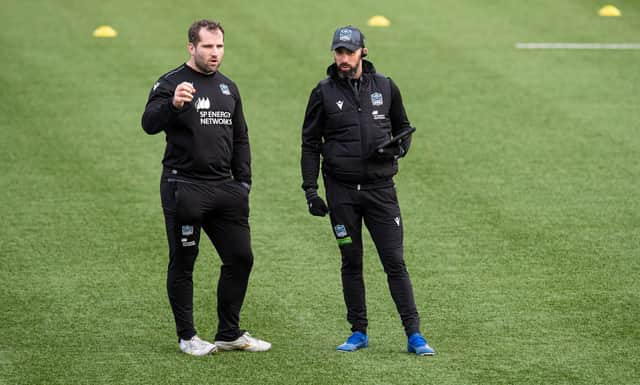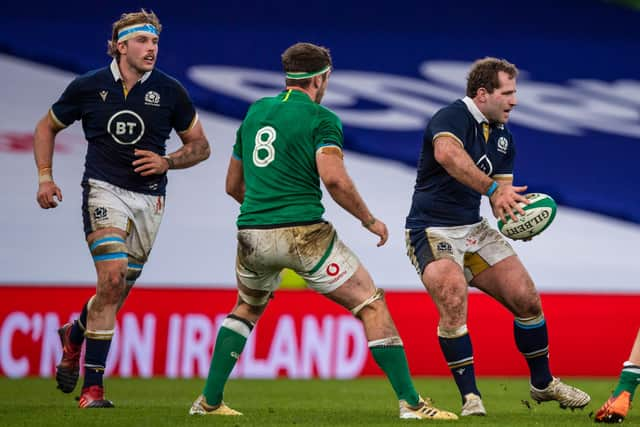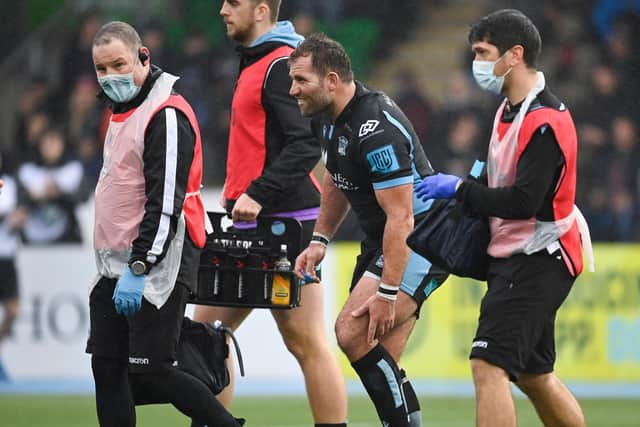Fraser Brown: Being injured can be difficult and there were times last season when it was 50-50 as to whether I would get back playing or not


I was in London last week to see a specialist about my knee injury. When I travelled down I was wearing a knee brace and expecting to be out for another three months. By the time I returned home the brace had been cast aside and I was looking at a far speedier return of only four weeks or so.
I had ruptured my posterior cruciate ligament against Zebre in Italy on October 16. A PCL rupture can leave you with instability in your knee and at the time it was hard to assess the extent of the damage due to the amount of swelling around the joint. Fast forward five weeks, the swelling had gone, any pain had pretty much disappeared, and the joint looked reasonably stable.
Advertisement
Hide AdAdvertisement
Hide AdFortunately, I’ve always been blessed with pretty decent muscle bulk around my knees which is extremely important with PCL injuries as the muscles help to stabilise your knee and do the work normally done by a fully functionally PCL.


I started running this week and, fingers crossed, depending on how I progress over the next couple of weeks, and how quickly I can find a new pair of lungs, I could be back in time for some of the European games or the Christmas derbies.
It’s been a difficult year for me with injuries, particularly because of what I have potentially missed out on the international stage. The last game I played for Scotland was against Ireland at the end of the Autumn Nations Cup, a year ago next weekend, when I prolapsed a disc at the top of my back.
If I’m fit, playing well, and selected for the Six Nations it’ll be over a year since I played for Scotland. Something I thought I’d never be fortunate enough to do, playing for my country is the greatest privilege I will ever have as a professional rugby player and it’s a great goal for me to have had throughout the early stages of this injury.
Being injured can be difficult to come to terms with at certain times in your career. My neck injury last year was as serious as I’ve had and there were times not long after it happened when it was 50-50 in terms of whether I would get back playing or not.


Disc injuries can be complex and very frustrating. It’s a waiting game and there is very little you can do to speed up the healing process other than rest and try to get a good night’s sleep, not as easy as it sounds.
I was lucky that after an initially horrendous few weeks, I recovered quicker than I thought I would, and I got back to full health and full strength, and I’ve had no issues since.
Injuries will happen in rugby. It’s the nature of the game but it doesn’t make it easier because you are always going to miss out on something, whether that’s Glasgow games, Scotland games or opportunities to perform to get selected for club, country or even the Lions.
Advertisement
Hide AdAdvertisement
Hide AdIf you’re not prepared, being injured can leave you a very lonely place. I have always found that you have to try to maximise the time you’re out in order to return fit, ready and motivated.
You must have a very clear picture in your mind of what you want to achieve. Obviously, you need to focus on healing and strengthening, but it is a great opportunity to develop new skills or plan for what’s next in life when father time ends your playing career.
I’ve been fortunate in that respect to work and play for a fantastic club in Glasgow who support in any way they can. Danny Wilson has been brilliant for me and several other players since he took over, involving us in coaching planning sessions, meetings and allowing us to take on responsibility and coach when appropriate.
It’s very rare that you’re the only person injured in a rugby squad. We have a separate WhatsApp group for the injured players so we can communicate with each other whether planning gym times or more likely who’s making the coffees. It may not seem like much but knowing you are part of a bigger group helps keep you motivated and gives you support on the days when you need it.
The nature of the game now is such that you cannot expect to be playing pro rugby and not think that at some point you are going to pick up a serious injury.
I think players who are just starting their careers need to be aware of that. The risk in rugby now is far greater than it’s ever been and that’s despite the fact we’re putting all those processes in place to look after players’ health better than ever.
Players are faster, stronger and fitter and the collisions are bigger. People are more professional - they have more time to spend in training and on analysis.
When you get injured, you must treat it as part of your job and do whatever you can to come back fitter and stronger and as quickly as possible.
Advertisement
Hide AdAdvertisement
Hide AdThere will always be people upstairs who pay your wages asking, ‘when will he be back’ or ‘is he a greater risk now due to his injury’.
Media pressure too, can play a significant role in a player’s mental state while he is injured. It goes without saying, the higher profile the player, the more scrutiny he will come under.
Resilience is not something we are born with or without, it is developed over time, it can be stored and used when needed, and it is a player’s greatest asset in helping them overcome injury and adversity and I truly believe this.
A message from the Editor: Thank you for reading this article. We're more reliant on your support than ever as the shift in consumer habits brought about by Coronavirus impacts our advertisers. If you haven't already, please consider supporting our trusted, fact-checked journalism by taking out a digital subscription.
Comments
Want to join the conversation? Please or to comment on this article.
